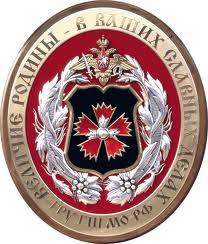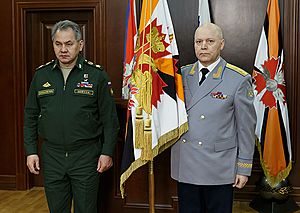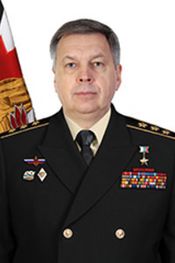GRU (Russian Federation) facts for kids
| Гла́вное управле́ние Генера́льного шта́ба Вооружённых сил Росси́йской Федера́ции Glavnoje upravlenije General'nogo shtaba Vooruzhonnykh sil Rossiyskoy Federatsii |
|
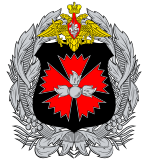
Emblem of the G.U. of the General Staff of the Armed Forces of Russia
|
|
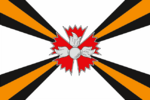 Flag of the G.U. of the General Staff of the Armed Forces of Russia |
|
| Agency overview | |
|---|---|
| Formed | 7 May 1992 |
| Preceding agency |
|
| Headquarters | Grizodubovoy Street 3, Moscow |
| Employees | Classified |
| Annual budget | Classified |
| Agency executive |
|
| Parent agency | General Staff of the Armed Forces of the Russian Federation |
| Child agencies |
|
| Website | Ministry of Defense Website |
The Main Directorate of the General Staff of the Armed Forces of the Russian Federation is a very important part of the Russian Armed Forces. It used to be called the Main Intelligence Directorate, and many people still know it by its old short name, GRU.
This agency is in charge of gathering military information from other countries. It also has its own special forces units, known as Spetsnaz GRU.
Unlike other Russian intelligence groups, the GRU reports to the Minister of Defence and the Chief of the General Staff. This means it is part of the military command.
The GRU is thought to be Russia's biggest foreign intelligence agency. It is known for taking on risky and complex missions. Some reports suggest it has many agents working in other countries.
Contents
History of the GRU
Early Beginnings
The idea of a Russian military intelligence group started way back in 1810. This was during the Napoleonic Wars in Europe. The War Minister, Michael Andreas Barclay de Tolly, suggested creating a special office for secret affairs.
Two years later, it was called the Special Bureau. Over the years, its name and role changed many times.
The GRU's first real start in Soviet Russia was on November 5, 1918. This date is now a special holiday for military intelligence in Russia. The first head of this new group was Simon Aralov.
This early intelligence service was known for being quite independent. It did not always follow the lead of other secret police groups like the NKVD or later the KGB.
Cold War Era
The GRU got its current name and structure in February 1942. This was during World War II, after Nazi Germany invaded the Soviet Union.
During the Cold War, the GRU had secret agents all over the world. Some agents worked openly from Soviet embassies. Others worked secretly without official cover.
The GRU also had listening stations to gather information from signals. One famous station was in Lourdes, Cuba.
Even though it was less known than the KGB, the GRU was involved in many important events. This included talks during the Cuban Missile Crisis. It also played a part in the Profumo affair in Britain.
The GRU was known for its strong ties with revolutionary groups. It also had tough training for its new recruits. Its existence was not public during the Soviet era.
However, a GRU officer named "Viktor Suvorov" (whose real name is Vladimir Rezun) wrote about his experiences. He helped make the GRU more widely known.
After the Soviet Union
After the dissolution of the USSR in December 1991, the GRU continued its work. It was one of the few intelligence groups that stayed mostly the same. The KGB, for example, was broken up.
In 2006, the GRU moved to a large new headquarters in Moscow. This showed its growing importance.
In 2009, its official name changed from "GRU" to the "Main Directorate of the Russian General Chief of Staff," or "G.U." But people still commonly call it "GRU."
The GRU faced some challenges after the 2008 Russo-Georgian War. It had problems finding out about new weapons used by Georgia.
However, it continued to be key in many Russian operations. This included Russia's actions in eastern Ukraine in 2014. It also played a role in the annexation of Crimea.
GRU agents were also linked to many online attacks in Western countries. These included attacks in the U.S., France, and Germany.
Some of its successes happened when Igor Sergun was in charge, from 2011 to 2016. After his sudden death, there were rumors about what happened.
The time when Igor Korobov was director saw some public setbacks. These included an attempted government takeover in Montenegro in 2016. There was also a poisoning incident in Salisbury in 2018.
Korobov died in 2018 after a long illness. Some thought his death was linked to problems with GRU operations. However, some experts believe that apparent mistakes might actually be part of a plan. They think the GRU wants to be noticed.
In 2018, President Vladimir Putin suggested bringing back the old name: Главное разведывательное управление (GRU).
How the GRU is Organized
The GRU is made up of many different departments. These are called directorates, directions, and sections.
Organization in 1997
In 1997, public information showed that the GRU had at least 12 main directorates. Each had a specific job:
- The First Directorate focused on Europe.
- The Second Directorate covered the Western Hemisphere.
- The Third Directorate handled Asia.
- The Fourth Directorate was for Africa and the Middle East.
- The Fifth Directorate managed military operations intelligence. This included naval and air force information.
- The Sixth Directorate was in charge of gathering information from signals and space. It used many types of aircraft, ships, satellites, and ground stations.
- The Seventh Directorate focused on NATO.
- The Eighth Directorate handled special purpose tasks.
- The Ninth Directorate dealt with military technology.
- The Tenth Directorate was about military economics.
- The Eleventh Directorate focused on strategic plans and weapons.
- The Twelfth Directorate was responsible for influencing information.
Organization in 2020
Experts believe the GRU's true structure is a secret. But based on interviews, the American Congressional Research Service suggests this organization:
4 Regional Directorates:
- First Directorate: European Union
- Second Directorate: North and South America, the United Kingdom, Australia, and New Zealand
- Third Directorate: Asia
- Fourth Directorate: Africa
11 Mission-Specific Directorates:
- Fifth Directorate: Operational Intelligence (gathering information during operations)
- Sixth Directorate: Electronic and Signals Intelligence. This includes GRU's online attack groups like Unit 26165 (also known as Fancy Bear) and Unit 74455 (also known as the Sandworm Team).
- Seventh Directorate: NATO
- Eighth Directorate: Russian Spetsnaz (special forces)
- Ninth Directorate: Military technology
- Tenth Directorate: Military economy
- Eleventh Directorate: Strategic plans
- Twelfth Directorate: Information Operations (influencing information)
- Space Intelligence Directorate
- Operational and Technical Directorate
- External Relations Department
Special Units
Unit 29155
Unit 29155 is said to carry out secret missions in Europe. These missions aim to cause instability. This unit has been operating secretly since at least 2008. Its existence became public in 2019.
Its members include experienced soldiers from past conflicts. This unit has been linked to several events. These include the 2014 annexation of Crimea. It is also linked to a poisoning incident in Bulgaria in 2015. The unit is also connected to the 2016 attempted government takeover in Montenegro. And it is linked to the 2018 poisoning of a Russian defector, Sergei Skripal.
Unit 29155 agents have also been tracked to Switzerland. This was when other GRU units were involved in hacking. They targeted the World Anti-Doping Agency and the Organisation for the Prohibition of Chemical Weapons.
Unit 54777
Unit 54777, also called the 72nd Special Service Center, focuses on psychological warfare. This means it tries to influence people's thoughts and actions.
This unit uses several front organizations. These include InfoRos and the Institute of the Russian Diaspora. In the 1990s, the unit spread false information in newly independent countries. Later, it worked to influence public opinion before conflicts.
Unit 26165
Unit 26165 is an online operations and hacking group. It is also known as Fancy Bear, STRONTIUM, and APT28. This unit was first created during the Cold War. Its job was to work with military intelligence codes.
The Netherlands has accused Unit 26165 of being involved in a 2018 hacking attempt. This targeted the Organisation for the Prohibition of Chemical Weapons (OPCW). It also targeted an investigation into the 2014 downing of Malaysia Airlines Flight 17.
Unit 74455
Unit 74455, also known as the Sandworm Team, used fake online names. It worked to release stolen political documents with WikiLeaks. This was done for the biggest political impact.
The United States Department of Justice has accused six Unit 74455 GRU officers of many online attacks. These include attacks on Ukraine's power grid in 2015. They are also linked to the 2017 NotPetya attacks and the 2018 Winter Olympics hack.
GRU Secret Agents
According to a Western report from 2018, the GRU has a long-running program for "illegal" spies. These are agents who work without official diplomatic cover. They live under fake identities in foreign countries for many years.
The report said the GRU is very active and well-funded. It has direct support from President Vladimir Putin. This allows it freedom in its activities.
The United States says that both the GRU and the SVR (its civilian counterpart) use both official and secret agents.
Special Forces of the Main Directorate
Commonly known as the Spetsnaz GRU, these special forces were created in 1949. After the dissolution of the Soviet Union in 1991, they remained part of the Russian GRU.
In 2010, they were moved to other agencies. But in 2013, this decision was changed. Spetsnaz GRU units were put back under GRU authority.
Training for GRU Officers
GRU officers train at a Ministry of Defence military academy. Intelligence agents get extra training at the Cherepovets Higher Military School of Radio Electronics. The A.F. Mozhaysky Military-Space Academy also trains GRU officers.
GRU Activities Around the World
The GRU gathers information using military attaches and foreign agents. It also has strong capabilities for listening to signals and taking satellite images. The Soviet GRU's Space Intelligence Directorate launched over 130 satellites for gathering signals.
Austria
On November 9, 2018, Austrian Chancellor Sebastian Kurz said a retired army colonel was believed to have spied for Russia for years. The officer was accused of selling official secrets to his GRU handlers from 1992 until 2018.
In 2019, Austria's Interior Ministry confirmed the colonel's handler was a GRU officer named Igor Egorovich Zaytsev. An international arrest warrant was issued for him.
Bulgaria
An investigation linked GRU officer Denis Vyacheslavovich Sergeev to the 2015 poisoning of a Bulgarian businessman. This attack was similar to the Salisbury poisoning. Three people were charged in Bulgaria in 2020.
In March 2021, six Bulgarian citizens were arrested in Sofia. They were accused of being part of a GRU spy ring in Bulgaria.
Canada
The GRU received information from Jeffrey Delisle of the Royal Canadian Navy. This led to several Russian Embassy staff being sent home from Ottawa.
Colombia
In December 2020, Migración Colombia said two Russian diplomats were sent home. They were accused of spying. One was identified as Aleksandr Nikolayevich Belousov, a GRU officer. He was accused of trying to get information about the country's electricity system.
Czech Republic
On April 17, 2021, the Czech Republic announced that GRU officers were involved in two large ammunition depot explosions in 2014. These explosions killed two people and caused much damage.
Estonia
In 2007, Deniss Metsavas, an Estonian Land Forces member, was tricked into providing information to GRU agents. His father, Pjotr Volin, was also recruited to help.
In May 2017, Russian citizen Artem Zinchenko was found guilty of spying for the GRU in Estonia. He was later exchanged back to Russia.
In September 2018, Major Deniss Metsavas and Pjotr Volin were charged with giving secret information to the GRU. They were found guilty in February 2019.
Finland
In September 2018, Finnish police conducted a large operation against a company called Airiston Helmi Oy. This company had bought land near important straits and ports. While the official reason was money laundering, media thought the company might be a GRU cover. They believed it was preparing for a secret attack on Finnish locations.
France
Viktor Ilyushin, a GRU agent, was sent home from France in 2014. He was accused of trying to spy on the staff of François Hollande.
In August 2015, a GRU unit pretending to be Islamic State of Iraq and the Levant supporters attacked TV5Monde online. They took the TV channel offline for about 18 hours.
GRU's Fancy Bear group used fake Facebook accounts. They pretended to be linked to Emmanuel Macron's campaign staff. Their goal was to interfere with the 2017 French presidential election.
In December 2019, Le Monde reported that intelligence agencies found a possible GRU "rear base" in southeastern France. This base was likely used for secret operations across Europe. Investigators identified 15 agents linked to GRU's Unit 29155. These included Alexander Petrov and Ruslan Boshirov. They are believed to be behind the 2018 poisoning of Sergei Skripal.
Georgia
During a 2006 incident, four GRU officers were arrested in Georgia. They were accused of spying and sabotage. This spy network was managed from Armenia. The arrested officers were later handed over to Russia.
Spetsnaz GRU unit No. 48427 took part in the Russo-Georgian War.
Germany
German intelligence linked the 2015 Bundestag hack to the GRU. In 2020, Germany issued an arrest warrant for Dmitry Badin, a GRU officer. He was accused of playing a main role in the Bundestag hack.
In 2018, German officials reported that a key data network had been breached. This network was used by the German government. German media linked the attack to a Russian government-backed hacking group.
In February 2021, Germany accused a German citizen, Jens F., of spying. He was accused of giving building plans to GRU agents in the Russian embassy in 2017.
In September 2021, the German foreign ministry warned Russia about online attacks. These attacks targeted German lawmakers before an election. Germany said it had "reliable information" linking the attacks to the GRU.
Japan
In September 2000, Japan sent home Captain Viktor Bogatenkov. He was a military attaché at the Russian Embassy in Tokyo. He was accused of spying. Bogatenkov was a GRU agent who received secret information.
Latvia
In early 2018, an investigation suggested that a Russian diplomat in Latvia was a GRU agent.
In October 2018, Latvia's Constitution Protection Bureau accused Russia of a long-running online attack campaign. This targeted government groups, including defense.
Lithuania
In 2012, GRU officer Sergey Moiseyenko recruited a Lithuanian Air Force officer. This officer was to spy on Lithuanian and NATO military operations. Moiseyenko was arrested in 2014. He was later sent back to Russia as part of a prisoner exchange.
Mexico
In March 2022, General Glen D. VanHerck said that "the largest portion of the GRU members is in Mexico right now." He said they were looking for ways to influence the U.S. Mexican President López Obrador did not agree with this claim.
Moldova
In June 2017, Moldova sent home five Russian GRU agents. They were working with diplomatic cover from the Russian Embassy. They were believed to be trying to recruit fighters for the conflict in Ukraine.
Montenegro
Two Russian citizens were accused of organizing an attempted government takeover in Montenegro in October 2016. They are believed to be GRU officers. One of them, Eduard Vadimovich Shishmakov, had been officially identified as GRU in 2014.
The Netherlands and Switzerland
In September 2018, Swiss news reported that two men believed to be GRU agents were arrested in The Hague. This was after the Salisbury poisoning. They were planning to hack computer systems of a Swiss institute that analyzes chemical weapon attacks.
In October 2018, the Netherlands announced they had arrested four GRU agents. They were accused of trying to launch a major online attack against the OPCW headquarters. They also planned to travel to the Swiss laboratory.
Norway
In December 2020, the Norwegian Police Security Service (PST) said hackers linked to Fancy Bear and the GRU were likely behind a hack of the Storting's email system.
In October 2022, the PST arrested a Russian citizen. He was accused of "illegal espionage against state secrets." He had pretended to be a Brazilian academic.
Poland
In June 2014, Poland sent home a Russian military attaché and three other Russian citizens. They were accused of spying in a 2014 secret listening scandal.
In October 2014, Poland arrested two suspected GRU spies. One was a Polish Lt. Col. who worked for the GRU for years. The other was a lawyer who tried to get a job in the Economy Ministry.
In July 2019, a court in Warsaw found a former Economy Ministry employee guilty. He was accused of giving secret information to the GRU from 2015 to 2016.
In May 2020, Polish journalists accused the GRU of sending 700 fake bomb threats to Polish schools. They said this was part of a strategy to cause problems.
In March 2022, the Polish Internal Security Agency arrested a reporter. They identified him as a GRU agent. He was found with two passports and accused of spying.
In January 2023, Warsaw authorities arrested a Russian and a Belarusian citizen. They were accused of spying on Polish military facilities for the GRU since 2017.
Qatar
On February 13, 2004, two Russian men attacked Zelimkhan Yandarbiyev in Doha. He was a leader of Chechen rebels. A Qatari court found Anatoly V. Belashkov and Vasily A. Bogachyov guilty of the attack. The court said they acted on direct orders from Russian leaders.
Russia
Dmitry Kozak and Vladislav Surkov, who worked for Vladimir Putin, reportedly served in the GRU. Two Chechen commanders, Said-Magomed Kakiev and Sulim Yamadayev, led special battalions controlled by the GRU.
About 300 GRU soldiers and officers died during fighting in Chechnya.
GRU groups from Chechnya were sent to Lebanon after the 2006 Lebanon War.
Slovakia
In early 2022, Slovakia arrested four Slovak citizens. They were described as a "Russian spying network." They were accused of seeking information about NATO and Ukraine. Two were charged with spying and bribery.
Slovenia
In January 2023, the Slovenian Intelligence and Security Agency arrested two people in Ljubljana. They were accused of spying for the GRU and using fake documents. They were reportedly operating under assumed identities.
Spain
Reports suggest that a GRU group, Unit 29155, is being investigated in Spain. GRU members Denis Sergeev, Alexey Kalinin, and Mikhail Opryshko were reported to be in Barcelona around the time of the 2017 Catalan independence vote.
Sweden
In late 2021, Swedish authorities arrested two brothers, Peyman and Payam Kia. They were accused of serious spying for the GRU. Peyman had worked with the Swedish Security Service and Armed Forces.
Syria
The Sixth Directorate was in charge of a secret listening post in Syria. This was before it was lost in 2014. The Sixth Directorate also has a listening post at Hmeimim Air Base.
In 2015, GRU special forces soldiers reportedly appeared in Aleppo and Homs. GRU officials also visited Qamishli.
Turkey
In 2018, the Turkish government released videos of an attack on a Chechen commander in 2015. They claimed the person responsible was the same as Anatoliy Chepiga from the Skripal attack in the UK.
Ukraine
The Spetsnaz GRU were involved in the annexation of Crimea by the Russian Federation. They also took part in the war in Donbas.
During the November 2018 Kerch Strait incident, GRU's Unit 54777 sent text messages to Ukrainian men. These messages told them to report for military service.
News reports and cybersecurity firms say the GRU hacked the computer networks of a Ukrainian energy company, Burisma.
Spetsnaz GRU are involved in the 2022 Russian invasion of Ukraine. Their first reported loss was Captain Alexey Gluschak, who died in Mariupol on March 8.
United Kingdom
In September 2018, the Crown Prosecution Service named two Russian citizens. They were Alexander Petrov and Ruslan Boshirov. They were suspected of trying to attack former GRU officer Sergei Skripal and his daughter in March 2018.
British Prime Minister Theresa May said the suspects were part of the G.U. intelligence service. She said the attack was "almost certainly" approved at a high level of the Russian state.
Later investigations showed that "Boshirov" was Anatoliy Chepiga, a GRU officer. "Petrov" was Alexander Mishkin.
United States
GRU officer Stanislav Lunev left Russia for the U.S. in 1992. In the 1990s, he claimed that small nuclear weapons had been secretly placed in the U.S. and other countries. These were to be used by Russian agents in case of war. Searches were done in the areas Lunev identified, but no such weapons were found.
Electoral Interference
On December 29, 2016, the White House took action against nine groups and individuals. This included the GRU. They were accused of trying to cause problems and spread false information during the 2016 United States presidential election.
On July 13, 2018, several GRU staff members were accused of crimes. GRU Unit 26165 and Unit 74455 were said to be behind the DCLeaks website. They were accused of getting and sharing information from voter data and email accounts. These included emails from John Podesta, Hillary Clinton, and others involved in the 2016 US presidential campaign.
According to Microsoft, a GRU-run group called Strontium has been involved in online attacks. These attacks targeted at least three campaigns in the 2018 midterm elections.
In November 2021, a Russian group in the U.S. closed. In March 2022, Elena Branson was accused of working as a foreign agent by the FBI.
Directors of the GRU
The Head of Russian Military Intelligence is a military officer. This person advises the Russian Minister of Defense and the Russian Chief of the General Staff. They also answer to the President of Russia if asked.
| No. | Head | Term | Presidents served under |
|---|---|---|---|
| 1 | Yevgeny Timokhin | November 1991 – August 1992 | Boris Yeltsin |
| 2 | Fyodor Ladygin | August 1992 – May 1997 | Boris Yeltsin |
| 3 | Valentin Korabelnikov | May 1997 – 24 April 2009 | Boris Yeltsin Vladimir Putin Dmitry Medvedev |
| 4 | Aleksandr Shlyakhturov | 24 April 2009 – 25 December 2011 | Dmitry Medvedev |
| 5 | Igor Sergun | 26 December 2011 – 3 January 2016 | Dmitry Medvedev Vladimir Putin |
| 6 | Igor Korobov | 2 February 2016 – 21 November 2018 | Vladimir Putin |
| 7 | Igor Kostyukov | 22 November 2018 – present | Vladimir Putin |
Images for kids
-
Wreath laying ceremony for past GRU agents
-
5th GRU chief Igor Sergun with Defence Minister Sergey Shoigu and Chief of the General Staff Valery Gerasimov
See also
 In Spanish: Directorio Principal del Alto Estado Mayor de las Fuerzas Armadas de la Federación de Rusia para niños
In Spanish: Directorio Principal del Alto Estado Mayor de las Fuerzas Armadas de la Federación de Rusia para niños
- Active measures
- Farewell Dossier
- Intelligence Directorate of the Main Staff of the Russian Navy
- Leopold Trepper, an organizer of a Soviet spy ring prior to World War II
- Nuclear suitcase bomb
- Office of Strategic Services
- Pavel Sudoplatov
- SMERSH
- Vatutinki
- Viktor Suvorov
- Vulkan files leak
 | Jessica Watkins |
 | Robert Henry Lawrence Jr. |
 | Mae Jemison |
 | Sian Proctor |
 | Guion Bluford |


